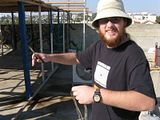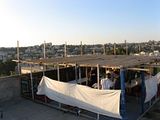Erev Sukkot, 5767
"Chag Sameach!"
You'd think I'd hear this in the streets here, passing other religious Jews, maybe from a teacher at school, a friend on the phone. Certainly, all of these people have wished me a happy holiday, with Sukkot right around the corner, beginning tomorrow night. But were I in Atlanta, I might find the same - friends leaving Pardes Atlanta classes certainly would wish such for each other, as would Jews walking to or from shul on Friday night, or the teachers at the Weber School.
But in Atlanta, when you've spent 45 minutes going back and forth in broken Hebrew and English over an overcharge for your internet, your technical support agent won't wish you a Chag Sameach. Your tech support person, most likely, wouldn't have any idea there was a holiday, in any religion, by the name of Sukkot. Heck, you'd be lucky to get a "Merry Christmas."
Israel during the holidays. Wow.
So, with Shabbat/Sukkot right around the corner, and me fresh out of the insight I pride myself on (oh, the ego can be such a wondrous thing), I thought I'd rehash some of the studies I've been working on.
Either before Rosh Hashanah or before Yom Kippur, it is customary to do what is called "Seder Hatarat Nederim," or "Annulment of Vows." In this system, one gathers together a Beit Din (a panel of three learned men, often rabbis), states aloud one's desire to renounce their vows, and the beit din, in turn, acknowledges that request and grants it. Similarly, on Erev Yom Kippur, we listen to, and say correspondingly in an undertone, a prayer called "Kol Nidre," or "All the Vows." In this prayer, we collectively renounce any vows we've made in the past year, and renounce all future vows we'll make in the coming year.
So, seriously, why are these vows so important? Who really cares?
Here is the real crux of the issue. When you commit yourself to a vow, for instance, telling a friend that you'll meet them for lunch tomorrow, you are, in a sense, creating mitzvot. As such, when you do meet that person, you're fulfilling a mitzvah. Pretty terrific, right? Well, as such, it is terrific. That said, if you fail to show up, if you fail to complete your vow, you're in a sense breaking a mitzvah. What's that mean?
Well, it isn't good.
So, in reality, one should really avoid making "Nederim," or vows. So, when someone really frum (read: religious-acting) says something that might be perceived as a vow, they usually add on "Bli Neder," or "without a vow." That said, we all happen to let vows slip in, or we pick up vows in ways that we don't even realize. Which ushers in the concept of minhag.
So, essentially, minhag is the set of customs which we practice - cultural laws, cultural mitzvot. While our Jewish culture has an obligation to fulfill these practices, they aren't taken directly from Torah. In essence, minhag are cultural vows that have been made and passed down to us.
Personally, though, we can make our own minhag. How do we do this? Essentially, if you do anything three times in a row, without a break, you've created minhag. Let's look at an example.
There is an obligation, on Shabbat, to have candles lit in the home in which you're going to sleep. Therefore, before one leaves for shul, one has an obligation to make sure that there are candles lit. This is based on Torah law. Now, let's say you walk to shul, then to a friends place, where you're planning on spending the night. Before you leave, though, for three weeks in a row, you light Shabbat candles in your home anyway. What has happened? You've created a minhag for yourself; you now have an obligation to light candles in your home, even if you're not going to sleep there.
So, essentially, there are lots and lots of ways to not fulfill your vows, in whatever form they take, and it's to your spiritual benefit to make sure you have as few vows in your life as possible. That said, if you're going to take on a vow, you better make sure it's one you intend to keep, to the point where those vows have to become defining points in your life.
Now, this all sounds ultra-religious, and ultra-frum, and for the most part, that's right; I know very few people outside of the ultra-orthodox who really obsess, every day, ensuring they aren't making vows. On the flip side, if you're worried about accidentally creating vows and minhag with everything you do, aren't you, in a sense, living a frozen life, unable to move forward for fear of accidental mitzvah-breaking? No.
At its basis, all this halakha is really bringing to light the concept of mindfulness. In our day-to-day life, it's all too easy to fall into apathy, and let our days slip by without a real awareness of what we're doing. It all revolves around tying yourself to vows that aren't really important, in a sense, cheapening the vows that really mean something. We should try to lead our everyday life with a constant awareness of our now, of what we're doing, what we're saying, so that our time doesn't become a conversation we've already had a dozen times. More clearly - don't be afraid to make vows; just be afraid to make the wrong vows. Focusing that level of clarity on the choices we're making now regarding the future, as ambiguous and attractive that future can seem, retroactively ensures that our present is as beautiful, clear, and perfect as possible.
Now is the Festival of Booths, when we leave our homes and spend as much time as possible in temporary housing, hearkening back to our time in the desert and reminding us of how little is actually ours. When we pare down our lives to it's essentials: food, shelter, and the people around us, we're reminded of that which is so important to us. If love is a vow, then don't be afraid to give it out; at the same time, don't cheapen your love to something easily committed and forgotten. Love completely, but make sure your love is special.
As Shachar the HOT man (cable company) would say:
Chag Sameach, and Shabbat Shalom.
------------------
Here are some pictures of the sukkah I spent a couple days helping to build on the Pardes rooftop, with a bonus shot of my beautiful etrog (one of the four species for Sukkot). Unfortunately, I only took pictures on day 2 of the build, so I don't have it's bare bones going together.

A view of our building, in the beginning stages of the sukkah (see the roof).

The frame coming together, with the Schach (covering) in the forground.

Gittin' 'R Dun.

Sarah Barefoot tying down the Schach.

Builder/Drillmaster Raif, via Urbana, Illinois, T.C.B. (That's Takin' Care of Business)

As the sun goes down, the sukkah couldn't look better.

Boris, from Berlin via the Ukraine, pondering 40 years in booths.

Nothing like a beer or two after a job well done. (Shoshana, Raif, Sarah, David, in order)

My etrog.


0 Comments:
Post a Comment
<< Home